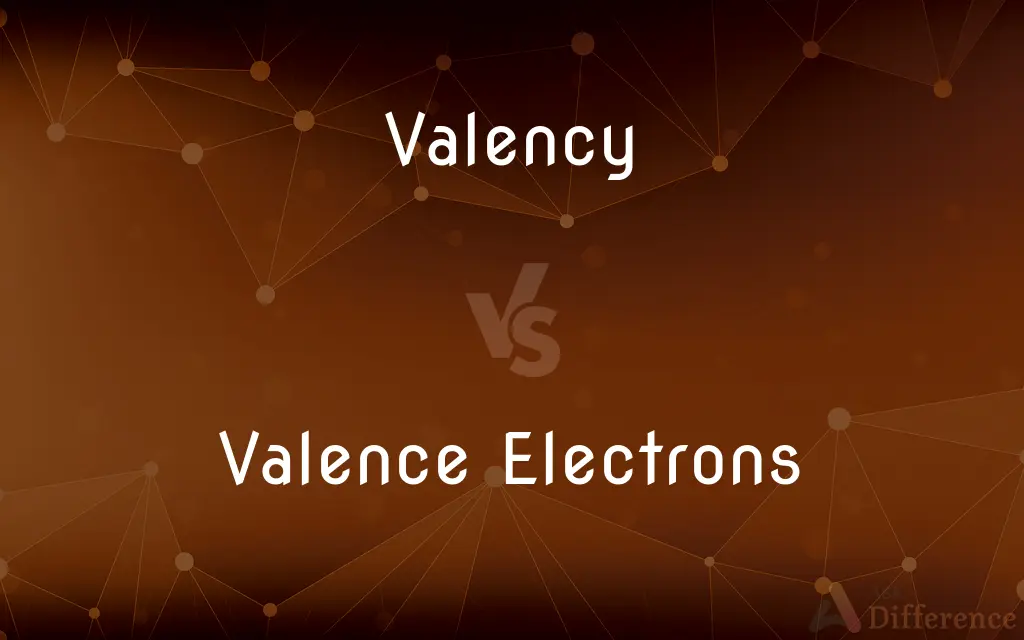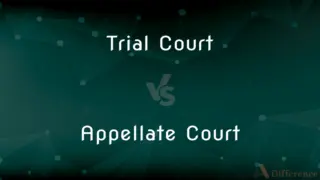Valency vs. Valence Electrons — What's the Difference?
By Tayyaba Rehman — Published on October 25, 2023
Valency is the combining capacity of an atom to bond with other atoms, whereas valence electrons are the outermost electrons involved in chemical bonding.

Difference Between Valency and Valence Electrons
Table of Contents
ADVERTISEMENT
Key Differences
Valency and Valence Electrons are crucial concepts in chemistry, particularly in understanding how elements interact and bond with each other. Valency refers to the combining capacity of an atom or an element, indicating its ability to bond with other atoms. It essentially represents how many electrons an atom needs to gain, lose, or share to attain a stable, noble gas configuration. In contrast, Valence Electrons are the electrons that are located in the outermost shell of an atom and are involved in the formation of chemical bonds with other atoms.
Valency is derived based on the number of Valence Electrons. If an atom has one, two, or three Valence Electrons, its Valency is usually equal to the number of Valence Electrons. If an atom has five, six, or seven Valence Electrons, its Valency is determined by subtracting the number of Valence Electrons from eight. For atoms with four Valence Electrons, the Valency can be either four or zero. Valence Electrons play a pivotal role in determining the Valency, as they are directly involved in the chemical bonding process, interacting with the Valence Electrons of other atoms.
Understanding the Valency is pivotal for predicting the types of chemical bonds an element can form and its chemical reactivity. It provides insights into the potential combinations in which elements can occur and how atoms are likely to interact in chemical reactions. Valence Electrons, on the other hand, are crucial for understanding the electron distribution in an atom and the atom’s energy level configurations. The number and arrangement of Valence Electrons affect the atom's chemical properties and its ability to form bonds with other atoms.
Valency is an integral parameter in writing chemical formulas and balancing chemical equations as it determines how atoms of different elements combine to form molecules. Understanding Valency can elucidate the stoichiometry of a compound, illustrating how atoms are proportionally combined in molecules. Valence Electrons are paramount in studying and understanding the periodic trends in the periodic table, such as electronegativity, electron affinity, and ionization energy, which are vital for predicting the chemical behavior of elements.
Comparison Chart
Definition
Combining capacity of an atom to form bonds.
Electrons located in the outermost shell of an atom.
ADVERTISEMENT
Role in Bonding
Determines how atoms of different elements combine.
Directly involved in the formation of chemical bonds.
Impact on Properties
Predicts chemical reactivity and types of bonds an element can form.
Affect chemical properties and ability to form bonds.
Use in Chemistry
Integral for writing chemical formulas and balancing equations.
Crucial for understanding electron distribution and periodic trends.
Determination
Derived based on the number of Valence Electrons.
Determined by the atom’s electron configuration.
Compare with Definitions
Valency
Valency is the measure of an atom's ability to combine with other atoms.
Hydrogen has a Valency of 1 as it can form one bond with other atoms.
Valence Electrons
Valence Electrons are crucial for understanding periodic trends in the periodic table.
Valence Electrons aid in studying trends like electronegativity and ionization energy.
Valency
Valency is crucial for writing chemical formulas and balancing equations.
Understanding the Valency of elements is vital for correct chemical formulations.
Valence Electrons
Valence Electrons impact an atom’s ability to gain or lose electrons.
Atoms strive to lose, gain, or share Valence Electrons to achieve stability.
Valency
Valency can elucidate the stoichiometry of a compound.
The Valency of elements in a compound reveals how atoms are proportionally combined.
Valence Electrons
Valence Electrons are the electrons in the outermost shell of an atom.
The Valence Electrons determine an element's ability to form chemical bonds.
Valency
Valency helps in predicting the chemical reactivity of elements.
Elements with higher Valency tend to be more reactive.
Valence Electrons
Valence Electrons are directly involved in the formation of chemical bonds.
The interaction of Valence Electrons is pivotal during chemical reactions.
Valency
Variant of valence.
Valence Electrons
The number of Valence Electrons affects an atom's chemical properties.
Atoms with similar Valence Electrons exhibit similar chemical behaviors.
Valency
Senseid|en|chemistry}}{{alternative form of valence
Valency
The capacity of something to combine with other things, as for example the capability of a vaccine as measured by the number of pathogen serotypes that it can counteract.
Vaccine valency
Valency
The number of edges connected to a vertex in a graph.
Valency
Senseid|en|linguistics}}{{alternative form of valence
Valency
(uncountable) Importance, significance.
Valency
See Valence.
Valency
The phenomenon of forming chemical bonds
Valency
(biology) a relative capacity to unite or react or interact as with antigens or a biological substrate
Valency
(chemistry) a property of atoms or radicals; their combining power given in terms of the number of hydrogen atoms (or the equivalent)
Valency
Valency indicates the number of electrons an atom needs to gain, lose, or share to attain stability.
Chlorine, with a Valency of 1, needs one electron to reach a stable state.
Share Your Discovery

Previous Comparison
Coupon Rate vs. Discount Rate
Next Comparison
Chainmail vs. RingmailAuthor Spotlight
Written by
Tayyaba RehmanTayyaba Rehman is a distinguished writer, currently serving as a primary contributor to askdifference.com. As a researcher in semantics and etymology, Tayyaba's passion for the complexity of languages and their distinctions has found a perfect home on the platform. Tayyaba delves into the intricacies of language, distinguishing between commonly confused words and phrases, thereby providing clarity for readers worldwide.
















































